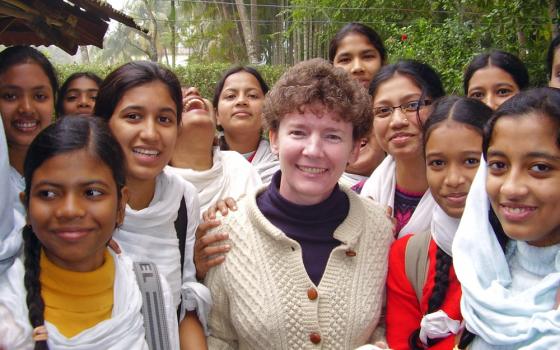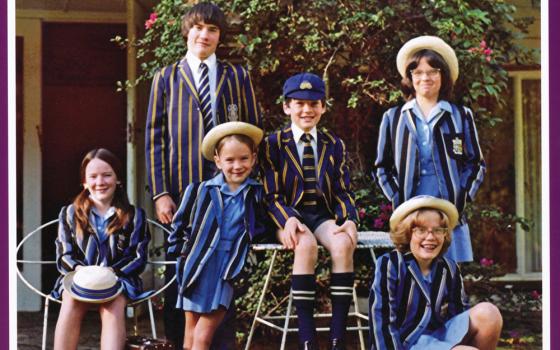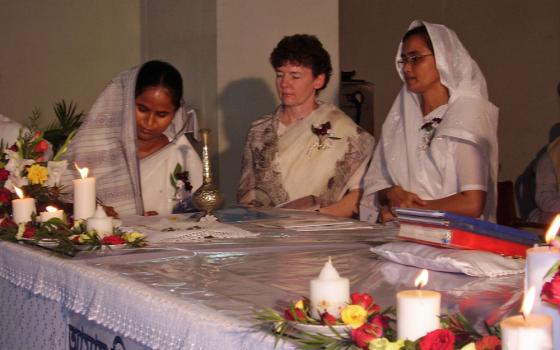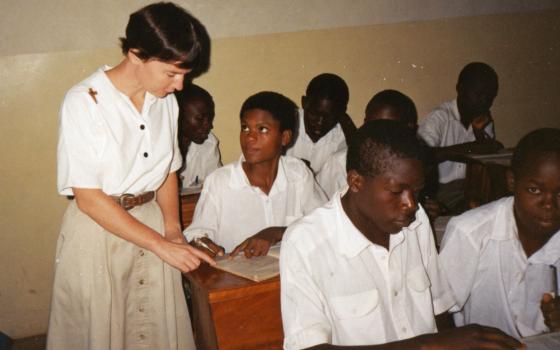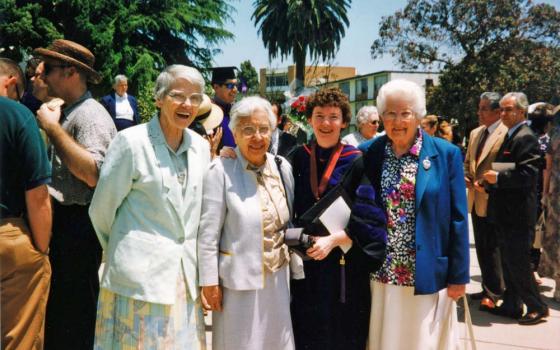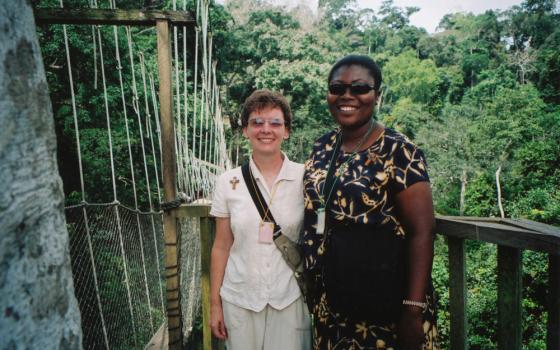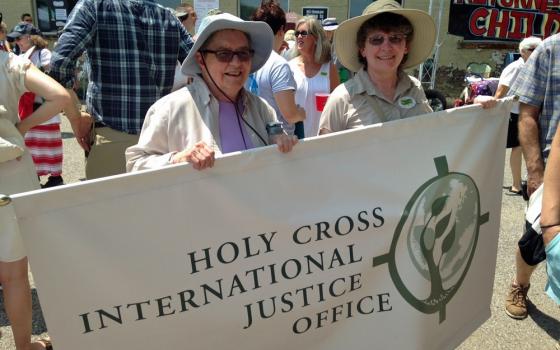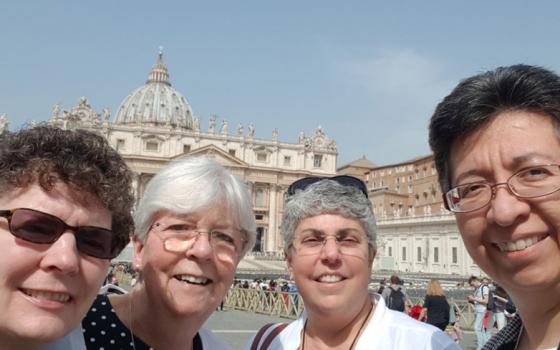An immigration lawyer who has lived as an immigrant in four countries, Holy Cross Sr. Sharlet Wagner is now taking on the presidency of the Leadership Conference of Women Religious.
That past, those who work with her say, has come to color her worldview, interactions and leadership style.
"My experience of living internationally and being connected with so many countries and people — I bring that deep desire to LCWR and hope that we can continue to move our deepening sense of sisterhood with other conferences," said Wagner, who currently lives in South Bend, Indiana, and is the First Councilor of her community.
At the upcoming Aug. 7-10 LCWR assembly, Wagner, 56, will transition from president-elect to president, leading the conference as part of the presidential triumvirate: Sister of Charity of the Incarnate Word Teresa Maya (who will transition to past president), and a new president-elect, who will be elected at the assembly.
"There's such a need for the world to see that we can live together and work together, and I think that's an area where religious could be a prophetic voice and speak of the Gospel values," she said.
A decision to dive into religious life
Born June 22, 1962, in Bellevue, Nebraska, Wagner is the second-oldest of six children. Her father was a geologist for Exxon, moving the family all over the country with his job, as well as South Africa, when Wagner was between 11 and 16 years old.
Though her family was religious "in the sense that we went to Mass every Sunday," she said, Wagner explored and questioned her beliefs while attending the University of Texas at Austin, deciding after a couple of years that she didn't believe God existed.
Friendships brought her back to her faith, and in her junior year, Wagner became active at the Newman Center on campus.
"I can remember I was in a car listening to music in the back seat, and I kept thinking, 'Wouldn't it be wonderful if you could just spend your whole life loving God and serving people?' " said Wagner, who at the time was majoring in journalism.
"My next thought was, 'It sounds like I want to be a nun.' I immediately forgot it because it seemed crazy. People like me didn't become nuns. But the thought kept coming back to me."
Because she didn't know any women religious, Wagner kept that thought to herself, poring over Catholic newspapers in her college library to satisfy her curiosity. But her senior year, a Holy Cross sister arrived to do campus ministry, and Wagner turned to her to learn about her vocation and other communities.
"I remember her saying, 'It's kind of like swimming. You can walk around a pool, you can look at it and dip your foot in, test the water, but eventually, you have to dive in or walk away,' " Wagner said. "I decided I wanted to dive in."
Wagner joined the Sisters of the Holy Cross in 1988. After an eight-year spiritual and theological formation program, she made her perpetual vows in 1996.
"When Sharlet entered, she came across as quiet, introverted, someone who certainly had a worldly perspective and a certain self-confidence [that comes with] an ability to adapt to different situations," said Holy Cross Sr. Mary Louise Full, Wagner's novice director.
"It was very evident she had a fine mind and was quite intelligent, discerning, forming her own questions and opinions. But Sharlet has a very good sense of humor; she has a serious side, but she has a playfulness," she said.
For example, Wagner would lead her community in games from her days as a summer camp counselor.
"They'd drive me up a tree, but they were fun," Full said, laughing.
Wagner's roommate in South Bend, Holy Cross Sr. Brenda Cousins, confirmed Wagner's flair for setting aside the stress of leadership and just relaxing at home.
"We can just watch any old TV show like 'Andy Griffith' or something to get our brains cleared out or play games," said Cousins, who also lived with her while Wagner was in law school in Los Angeles.
"Even though she has heavy things on her plate, she knows how to play. That's what I appreciate about her: She can balance her life."
How a mission in Africa became a passion for immigration law
When Wagner joined the Congregation of the Holy Cross, the international community had its young sisters leave their countries of origin to do some form of ministry, so in 1993, Wagner jumped at the chance to revisit Africa, leaving her job as an English and journalism teacher in Salt Lake City.
As a temporary professed, she'd spend two years in Bundibugyo, Uganda, working at a clinic, stocking medicine, feeding chickens, teaching English classes, and driving people to the hospital. She also worked on income-generating projects for AIDS widows.
The town "was very remote: no TV, no mail, no newspaper, no running water, no electricity," she said, adding that the "desert experience" was particularly formative.
One thing that never left Wagner was the value Ugandans placed on relationships. While efficiency reigns in Western cultures, in Uganda, people actually take the time to greet each other, she said.
"I was teaching English and saw one of my high school students, and I said, 'Oh, I want to talk to you about your essay!' We talked, and after I had finished, she said, 'Good morning, how are you?' And I thought, 'Oh, I did it again.'
"That is such a value," Wagner added. "First establish the relationship, and then get into what you want to accomplish."
Upon returning to the United States in 1995, Wagner thought about the poverty she witnessed in Uganda and how she wanted to do something concrete to address the injustices in the world. She decided to attend Loyola Law School in Los Angeles and graduated cum laude in 1999.
"I think my experience as an immigrant myself, then having lived in other countries twice, my enjoyment of diversities, and my sense that immigrants at that point in our country were the most marginalized and had the least voice — that was the group I wanted to work with," said Wagner, who went on to specialize in immigration law.
After graduating, Wagner was awarded a two-year fellowship through her law school at the Central American Resource Center in Los Angeles. There, she established a pro bono project at a local detention center, conducting weekly presentations in Spanish and English for detainees as well as representing them in bond hearings and filling out their applications for various statuses.
But when an opportunity presented itself at Holy Cross Ministries in 2001, Wagner couldn't resist. She became their senior immigration attorney.
"I loved to use my immigration law in a setting that is congregation-sponsored," she said.
The immigrants she worked with in Salt Lake City often called her "Sister Charlie."
"She was like a mentor for me," said Mila Zepeda, a Peruvian immigrant who first met Wagner when she came in for a consultation as a client. Wagner eventually hired Zepeda, who had been an attorney in Peru, at Holy Cross Ministries.
"It's fantastic when an attorney can say to another person with honesty if that person has a chance or not with immigration," Zepeda said. "This was the first thing I found in her — the way she treated clients, talking to them with dignity, with compassion. I loved it.
"I remember sitting in the corner when she was doing the consultations and learning how she could deliver even bad news to the client with compassion. Even in the worst situations, we can deliver that information with dignity."
Maribel Real, who also worked with Wagner at Holy Cross Ministries, added that Wagner has "a lot of vision, always looking toward the future and how to better things and help better the lives of the people around her."
An example of this, Real and Zepeda said, was Wagner's successful advocacy for victims of domestic violence to fall under the U visa program, a benefit for undocumented immigrants who were victims of crime that offers protection to those who cooperated in the investigation or prosecution of the crime.
"She was really driven to accomplish that because she knew it was going to help a lot of people and make their lives easier," Real said. "She wasn't afraid to move forward with that."
Wagner's time in immigration law was interrupted in 2006, when she was sent to Kasoa, Ghana, for a year to help Holy Cross Sisters study the feasibility of an education project. Wagner and her fellow Holy Cross Sisters developed a plan for a school that began out of a garage but today has more than 700 students.
After a few more years working in immigration back in the United States, Wagner was elected to her congregation's leadership team in 2009, first as general councilor then in 2014 as first councilor, which she remains today. She serves as a liaison for Holy Cross Sisters in Ghana and Uganda and previously served as a liaison for Bangladesh and India.
But "going back to Africa is like going home," Wagner said.
'She really seems to thrive in leadership'
That experience in travel and Holy Cross' international missions, Full said, "broadens your awareness of people and blessings that we have as Americans."
She said Wagner has "grown in her awareness and conviction of who we are as a religious congregation and [our] ability to serve others. She brings an excellent academic background to that experience; she's very well prepared and able to relate her experiences to women religious in the world today and the struggles of women in the church, but also the poor and the underserved."
All who spoke to GSR about Wagner stressed her capacity to listen and take in all points of view, a strength that will serve LCWR well as she takes on the presidency, they said.
"What I have observed in Sharlet over the last year is that she really seems to thrive in leadership," said Amy Smessaert, director of the congregation's communications department. The two have worked together for nine years.
"I anticipate that she continues to embrace that and continues to listen and collaborate. And I think if you have those traits, you can't help but be changed in some way."
Wagner said she ultimately sees herself as a "citizen of the world."
Living in different countries and traveling internationally for Holy Cross "helped give me a broad vision of the world and a broader vision of humanity. [It's] given me an understanding — not at a head level, but at a deeper level — that there are many different ways to a good end and many good ways to a good end."
Cousins said in the decades she's known Wagner, she's seen her grow in her global perspective, though "the seeds were already there."
"She's very comfortable with differences," Cousins said. "I don't think rigidity in opinions is something she appreciates, but she's very persistent and logical in her encounters and discussions."
Wagner said she owes this worldview not just to her travels, but to the bonds she shares with Holy Cross sisters around the world. She joined shortly after her congregation opened formation programs in Asia, Africa and South America.
"This intercultural aspect of the congregation is a challenge for us at times, but also a tremendous blessing," she said. "These connections across countries and cultures are personally and communally enriching and give me energy and hope.
"I believe we are called as leaders to help identify and name our common experience; to help one another approach the other with curiosity rather than with fear; to recognize God's presence in the other and approach with reverence."
Not long after Wagner moved to Utah, she was walking around the neighborhood and thinking about the many places she had lived and how to answer the question, "Where are you from?"
"Suddenly, I realized, 'God is my home.' It was a joyful realization and put me in touch with the awareness that God is the constant in which I live and move. 'God is my home' has stayed with me over the years and become a personal mantra for me."
Hope for the future of religious life
Wagner's interests and experiences in her many ministries inform who she is in LCWR leadership.
"My love of diversity — I don't leave that aside. I carry it with me," she said, adding that her passion for justice for immigrants fits wonderfully with LCWR's involvement in that cause.
"One thing looking ahead that I would hope to see is that greater deepening sense of the global sisterhood, perhaps a connectedness with other conferences of women religious around the world," she said, adding that others in LCWR leadership and the International Union of Superiors General (UISG) share that desire.
Throughout the years, Cousins said she's witnessed Wagner grow as a leader, always a natural and collaborator who loves hearing ideas, but now sees a change inspired by her time in LCWR: "When we work on a committee together or something, and we've come to a place of indecision or impasse, she knows how to leave a contemplative space, and I think she learned that at LCWR. She has brought that into the way she leads here, which I appreciate and am learning from her."
Wagner said while she's always been aware of the challenges facing religious life, including the changing demographics and the restructuring the conference is undertaking, her year as president-elect has brought these into focus.
"But the challenge is an opportunity as well," she said.
LCWR will look at the results of a recently completed "needs assessment survey" sent to all its members as they get into strategic planning mode, considering additional services that the conference can offer to better meet communities' needs. Participants at the LCWR assembly will go over a broad overview of the results, Wagner said, while the board will do a "deeper dive" later.
Despite a number of internal changes — a new executive director, selling its building and moving locations, a new board — Wagner said she is proud LCWR has not lost sight of its external goals: "the justice work that is a critical component to who we are as a conference."
Full said Wagner offers a great deal when it comes to the big questions facing women religious today: What's our place in the world? How can we really be leaders and spokespersons for the underserved and voiceless? How can we broaden our lifestyles to integrate the burgeoning diversity and new perspectives within religious life?
"I have been inspired in a new way, and it's not so much from seeing how everything works on the inside, but more from the connections," Wagner said: connections with fellow Holy Cross Sisters around the world, her region in LCWR, the UISG members she met in Rome, the board, the presidency. These new relationships, she said, have given her "a great deal of hope for the future of religious life."
"This experience has sharpened and heightened that hope. It seems clear to me that religious life is in a period of evolution," she said.
"New forms may emerge, and ours is not to direct what emerges. Ours is to listen to the movement of the Spirit, to discern, to cooperate, but not to get caught up and bogged down by numbers. Cooperate with the movement of the Spirit and cooperate with what God is bringing forth."
[Soli Salgado is a staff writer for Global Sister Report. Her email address is [email protected]. Follow her on Twitter: @soli_salgado.]
